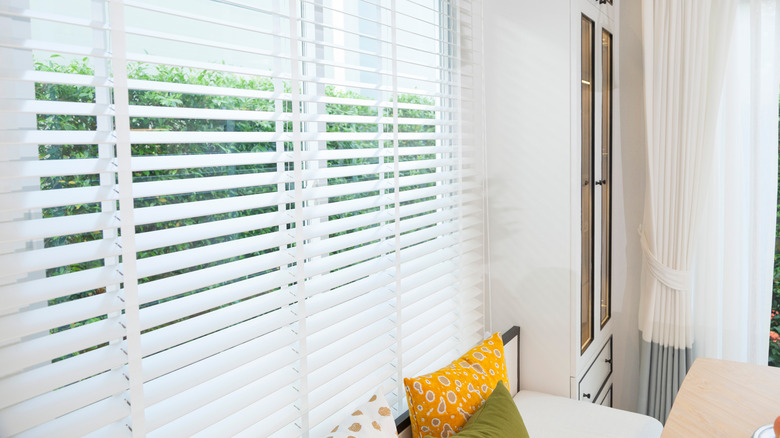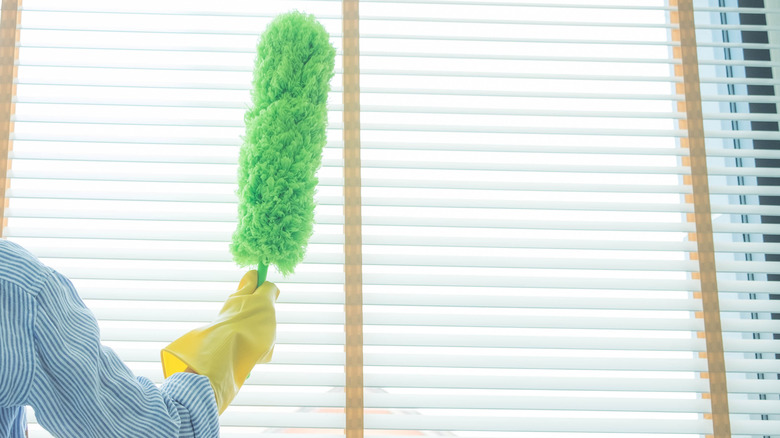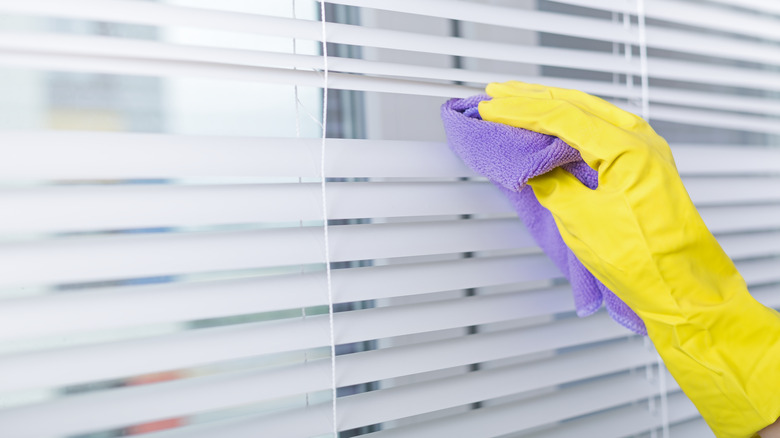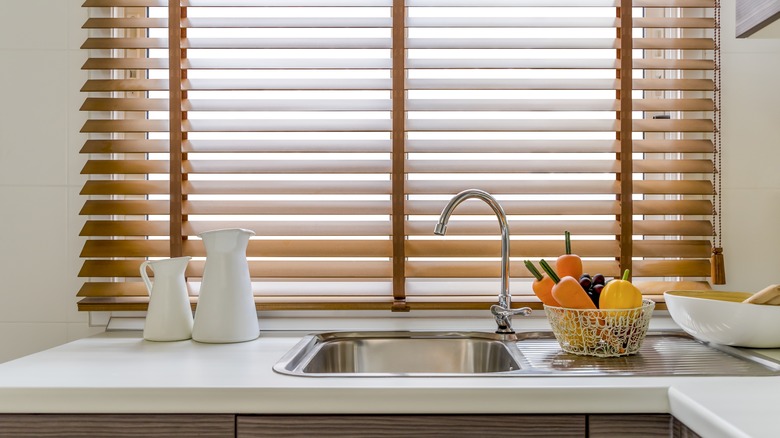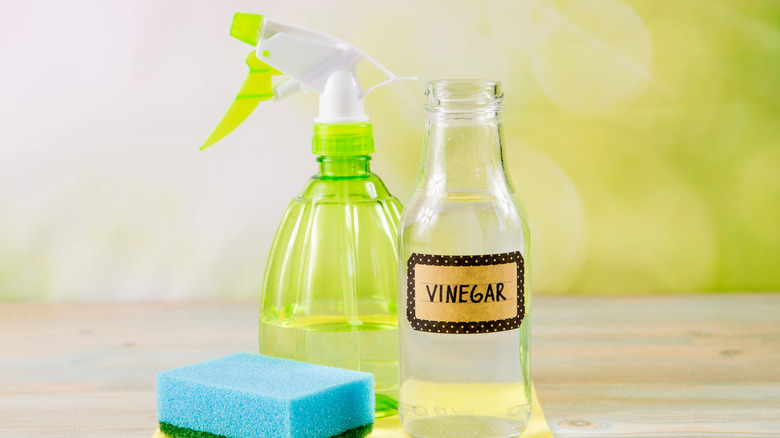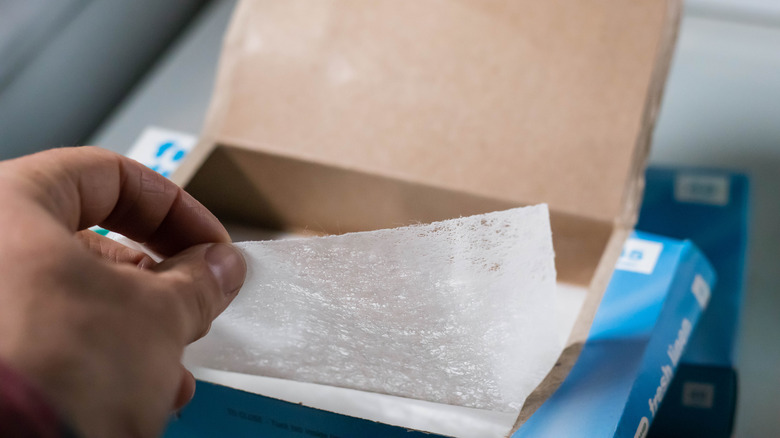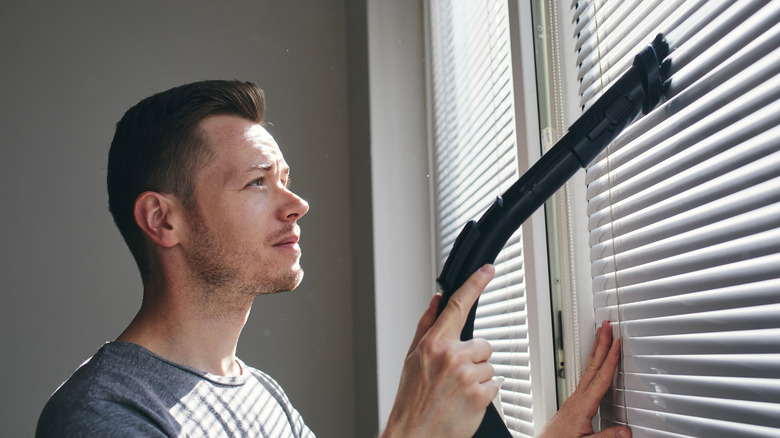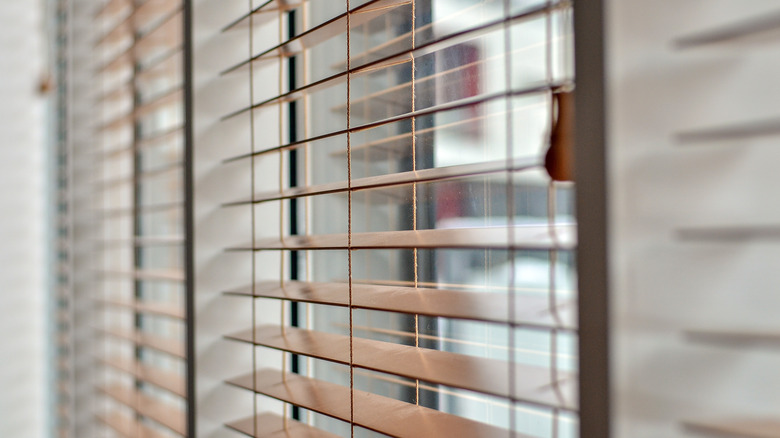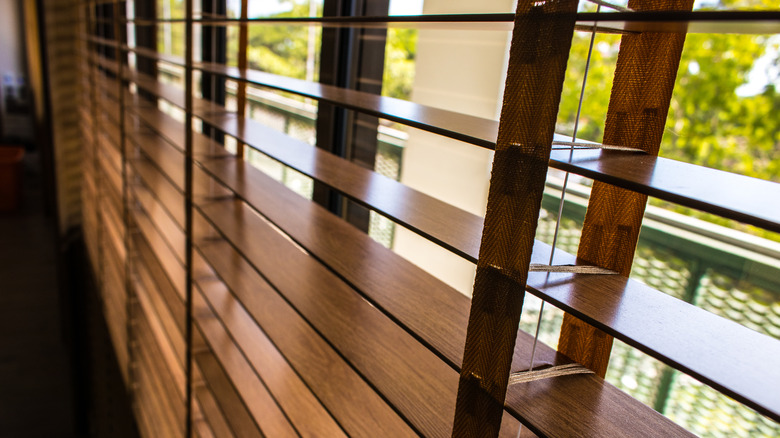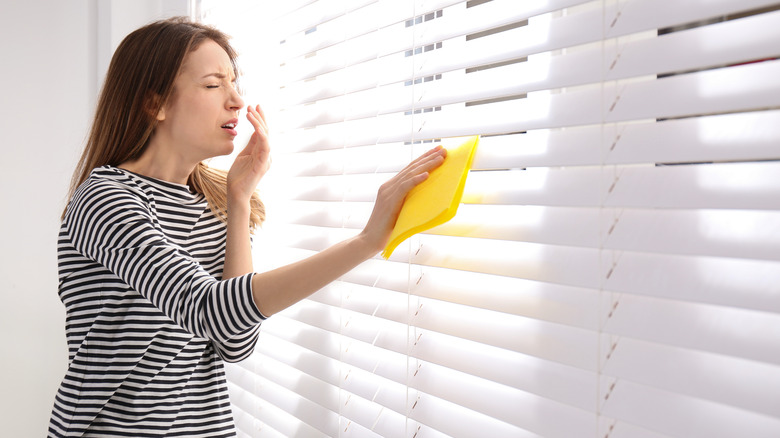How To Clean Wood Blinds
Blinds work in nearly every room in the house from the kitchen to the den, and even in bathrooms. They're chic window coverings and they have many purposes, including adding style to a room, providing insulation, and blocking light (Consumers Advocate). They can also provide just the right amount of desired privacy.
Window coverings — blinds and shades in particular — are a 6.12 billion market, and that's expected to grow to 8.76 billion by 2029. (Fortune Business Insights). When choosing blinds, ones made of wood are a great choice because they can easily be updated. Unlike other materials, wood blinds can be stained or dyed to fit your evolving style (via Remodel or Move).
Wood blinds combine fashion and function and create a polished look. However, they can also get dusty and grimy at times. While blinds typically last seven to eight years (Blinds.com), keeping them properly clean and in good working condition will protect your investment long term. Fortunately, cleaning your wood blinds is a simple task to take on.
Dust them
It seems simple enough to dust blinds with a feather duster. If you're wondering whether the blinds should be open or closed for general dusting, Budget Blinds suggests keeping the blinds closed, facing down, with the slats flat on the window. Still, sometimes a feather duster isn't enough. NBC News suggests using old socks as a quick and effective way to dust blinds. All you have to do is slip the sock over your hard and lightly wipe each slat of the blinds. Depending on how dusty the blinds are, you may need to use a few socks as they get dirty. Slightly dampen the sock and open the blinds completely. Wipe each slat thoroughly from side to side, working your way into tight spaces like around cords and near hardware. Make sure to work from the top down so the loose dust will settle on the bottom and can be wiped up when you're done (via Oh So Spotless).
Microfiber cloths also do a great job picking up dust and debris too. Blogger One Crazy House suggests making a DIY blind cleaning tool featuring kitchen tongs, microfiber towels, and rubber bands. Cover each side of the tongs with a small, tightly-wrapped microfiber cloth. Then, loop rubber bands around them to keep them in place. Use the makeshift tool to pinch each blind slat and carefully wipe along the entire length to thoroughly remove dust. If you'd like, you can also mist the slats with a cleaner that's suitable for wood blinds before wiping. Rinse the cloths in cool water as dust builds up on them along the way.
Cleaning tools and tips
The good news is you don't have to take your blinds down to give them a good, deep cleaning. If it's been a while since you've cleaned your blinds, be mindful of all the gunk you may be inhaling. As with many cleaning tasks, a simple mask or scarf can avoid any irritation this may cause (via CNET).
One Good Thing suggests using furniture polish for dusting. But don't spray the polish directly on the blinds though since it can be messy and shouldn't be applied to the cords. Instead, spray it onto a sock or cloth and then carefully wipe just the surface of the slats.
Need a little extra help removing grit or grime? Factory Direct Blinds says to consider using a hard-bristle brush to scrub them. Thoroughly wipe each side of the slats with a dry cloth first to remove dust. Then, use the brush to get rid of any remaining residue, working gently to avoid ruining the wood or the finish. You can also mist and then dry the slats with disinfectant spray to kill germs. Just make sure to avoid using any water or harsh chemicals that can ruin the surface of your wood blinds.
Avoid soaking blinds in water
It can be challenging to clean blinds dry, which is why it may be tempting to get them wet to loosen dust and dirt. But If there's one big rule about cleaning wood blinds, it's this — don't get them wet. If they do happen to get wet incidentally, dry them right away. As Select Blinds explains, wood can suffer from warping and bubbling when it gets wet. This can lead to unsightly damage and even issues with the blinds functioning properly. Keep in mind that even though blinds have a special treatment to seal the wood, it's best to err on the side of caution when cleaning them.
The cleaning experts at The Maids explain that a damp cloth is OK for cleaning wood blinds but anything with more moisture should be avoided. Be diligent about using as little water as needed — just enough to clean off the dirt (via Make My Blinds). Be extra careful to avoid any moisture getting into the end of the slats since the exposed wood is more porous and will absorb the water rapidly. Keep a dry cloth handy to wipe up any excess water.
Use vinegar
Vinegar is a great, natural cleaner. It's cheap, safe, and readily available at a variety of retailers. While its strength works to clean a lot of things around the house from toilets to coffee makers, One Good Thing points out that this strong acidity can damage wood surfaces. It's important to dilute the vinegar with water, so you can safely use it to clean more delicate items, like your wood blinds.
If you decide to use vinegar to clean your wood blinds, Budget Blinds advises a mixture of equal parts water and vinegar to make a more mild solution. Dip a damp cloth in the mixture and use it to carefully wipe the blinds, paying extra attention to any stubborn residue or stains (via Zebra Blinds). Avoid getting too much moisture on the slats throughout the process, and make sure you dry each slat completely when you're done.
Clean them with dryer sheets and repel dust too
Dryer sheets are so useful around the house. They can freshen and soften your laundry and keep your clothes wrinkle-free. And as Good Housekeeping points out, dryer sheets can also pick up household spills like flour, remove dust from ceiling fans, and wipe soap scum from your shower door. Most importantly for this article, dryer sheets repel dust from blinds, electronics, baseboards, and more.
British cleaning influencer Mrs. Hinch swears by dryer sheets for cleaning her blinds, as The Sun shared from her Instagram stories: "The reason I use tumble dryer sheets is because they're anti-static so they pick up all the dust," she said. "You don't need to wet them or do anything."
If you have last-minute company and need streamlined tidying, grab a dryer sheet and quickly run it along your blinds to remove visible dust and toss it in the trash. Plus, as an added bonus, dryer sheets will leave a fresh scent behind. Whether you choose dryer sheets with lavender, citrus, or fragrance-free, dust-free blinds are a cleaning win-win.
Vacuum up the dust
If regular light dusting or wiping with a cloth isn't enough, there's another option. Cleaning your blinds could be as easy as vacuuming them. Cleaning expert Nick Drew tells Express that your vacuum's brush setting is a safe and chemical-free method to dust both curtains and blinds. He says, "Simply close your curtains or blinds fully and run the small brush fixing of the vacuum cleaner over them to freshen them up." To eliminate odor, he suggests placing a few drops of your choice of essential oil right into the vacuum cleaner's bag.
Wayfair suggests using a systematic way to vacuum your wood blinds using your vacuum's attachment brush. Start at the top of the blinds and thoroughly vacuum each slat from side to side until you reach the bottom. Then, vacuum the other sides of the slats using the same technique. Don't worry if excess dirt and dust fall to the floor— you can vacuum it up when you're done.
If you don't have a vacuum attachment or you're looking for one specific for cleaning blinds, there are a lot of options online. Just make sure they're compatible with your vacuum. For example, this multi-angle dusting brush sold on Amazon works on Shark vacuums, is well-rated, and is under $17.
Clean strings and ladders
Cleaning the slats on your blinds isn't enough. To fully refresh the entire window treatment, you have to pay close attention to the strings and braided ladders in between as well. Yes, those are the names of the inner workings of blinds.
Luckily, Blinds Max has a glossary of important blind terms. For example, slats are the singular pieces of horizontal blinds, which in this case are made of wood. The braided ladder is the name of the two long strings that connect the horizontal blinds. They run through the middle of the slats from the top of the blinds to the bottom.
Allure Window Treatments recommends a couple of ways of cleaning these areas: apply shoe polish or shaving cream to a cloth and rub the strings to remove the built-up grime. For a dirty pull cord, they recommend soaking the cord overnight in a bag of a cleaning mixture of either 50% lemon juice and 50% hydrogen peroxide or 50% bleach and 50% water.
Use a wood conditioner
If well taken care of, blinds can last a long time. Keep them fresh and add a little shine at the same time. Budget Blinds says applying wood conditioner or lemon oil can help restore your blinds' luster, especially if they're aging or getting faded from the sun. One note of caution: keep the conditioner away from the blinds' strings and hardware because it could stain.
There are a lot of oil choices to keep your wood blinds hydrated and full of luster (Oh So Spotless). There are ready-made solutions formulated especially for conditioning wood. There are also some environmentally-friendly options like tung oil that can help repel mold and preserve the wood's color. You likely already have olive oil on hand in your kitchen. This is a budget-friendly way to prevent dings on your blind slats and adds a polished shine. However, Zebra Blinds cautions not to use olive oil if the wood is cracked because it could leach into the wood, potentially damaging the blinds.
Cleaning and oiling your blinds can help them look their best. But Blinds.com says it may be time to replace them if the slats are bent or discolored. If you have difficulty operating the blinds or they get stuck frequently, it might be best to swap them out for a better-functioning set. And if you have children or pets, prevent your blinds from becoming a safety hazard by replacing them if there are any dangerous, exposed cords.
How often to clean them?
So now that you know the best ways to clean your blinds, how often do you really need to clean them?
For regular maintenance, Oh So Spotless says it's best to dust them once every week or so. If you get in the habit of having a regular blinds cleaning schedule, you'll be able to stay on top of your blind maintenance and you'll avoid dust and residue building up. While frequent dustings are important, you should also plan to perform a deep clean of your blinds twice a year (via The Maids).
Dusty blinds can also aggravate frustrating allergy symptoms. Budget Blinds points out that cleaning your blinds and other window coverings can help maintain good air quality. Regular, thorough cleanings remove dust and can help reduce flare-ups of asthma and eczema, which are common among dust mite allergy sufferers (The American College of Allergy, Asthma, and Immunology). Not only will your window coverings look fresh and clean, but you'll be able to breathe easier in your home.
